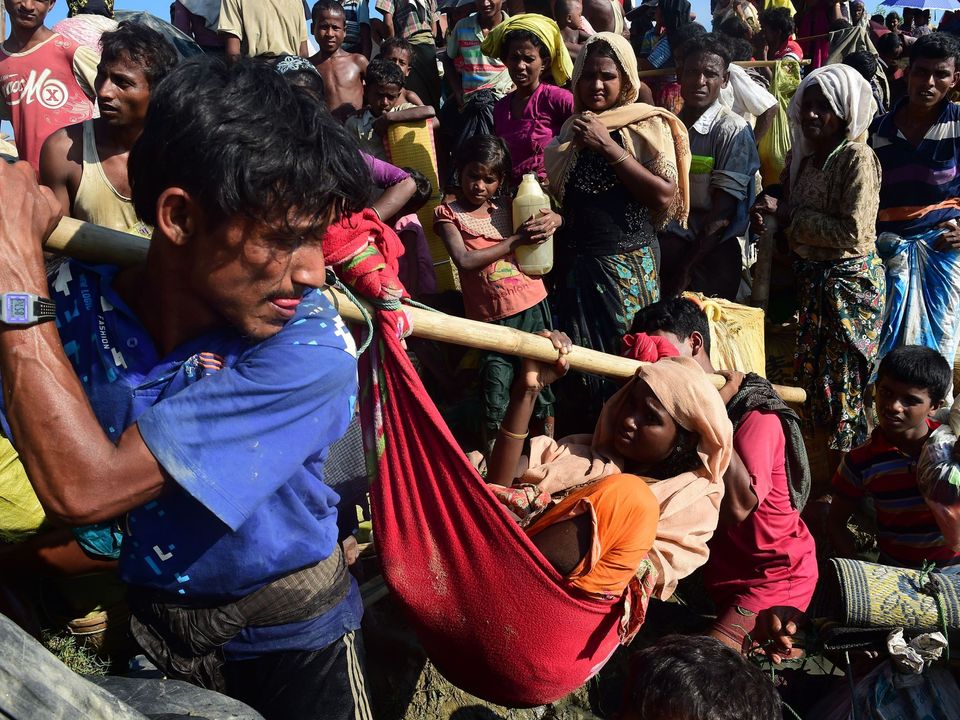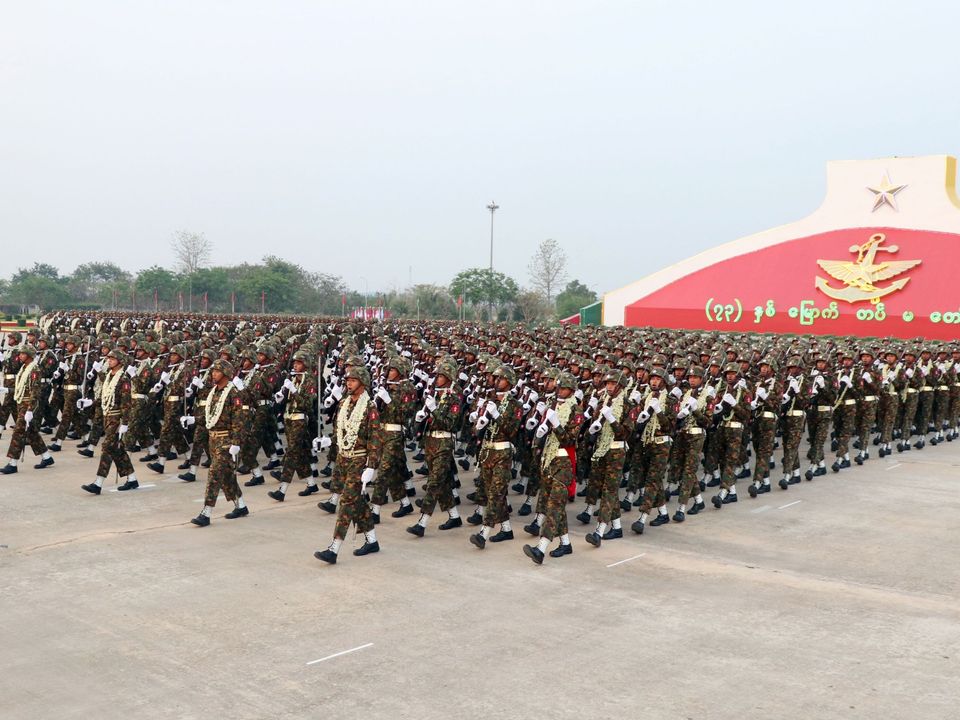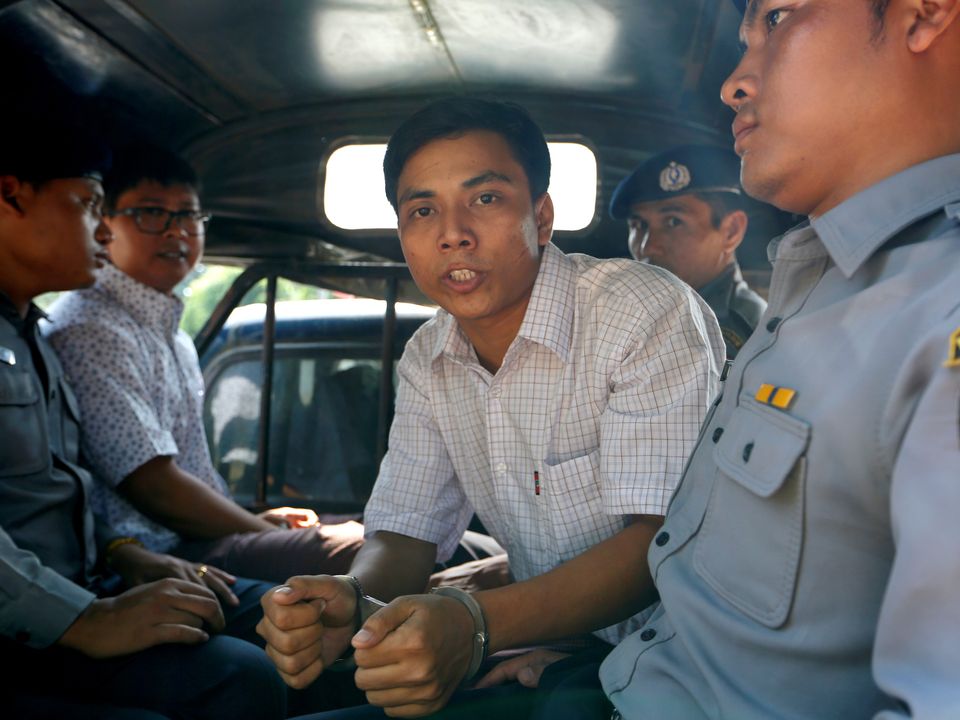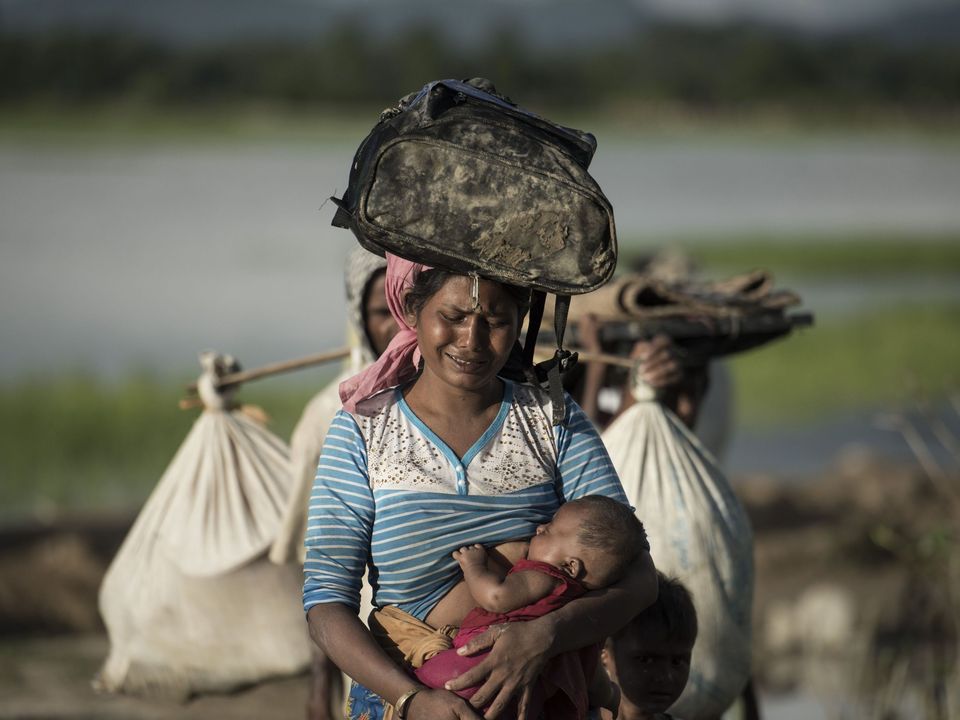Myanmar military could be investigated over Rohingya abuses
By Alex Crawford, special correspondent
Lawyers for 400 Rohingya refugees are to urge the International Criminal Court (ICC) to investigate the Myanmar military.
The refugees are arguing that without getting justice for what has happened to them, the crimes will continue and spread to other ethnic groups.
Senior diplomats from the 15-member security council travelled to Bangladesh earlier this month to see first-hand the situation of the 700,000 Rohingya refugees who fled there from Myanmar military abuses.
 Image:700,000 Rohingya refugees have fled to Bangladesh
Image:700,000 Rohingya refugees have fled to Bangladesh
The UK ambassador Karen Pierce said all members considered the Rohingya issue to be "one of the most significant human rights cases we have ever faced in the last decade", adding that "something needs to be done".
Sky cameraman Martin Smith, producer Neville Lazarus and myself witnessed some of the widespread human rights violations when we managed to independently reach Myanmar's Rakhine State at the end of last year.
Rakhine State is where most of the abuses have taken place.
We found thousands of people trapped on a beach there and left to die - many were severely emaciated.
All told chilling tales of human rights abuses - of being beaten, of being raped, of being hounded out of their homes. Image:Roningya refugees say armed soldiers beat them and removed them from their homes
Image:Roningya refugees say armed soldiers beat them and removed them from their homes
 Image:Roningya refugees say armed soldiers beat them and removed them from their homes
Image:Roningya refugees say armed soldiers beat them and removed them from their homes
They told us they had been herded there - to a stretch of sand, with their way back into Myanmar blocked by armed soldiers and landmines buried just beyond the beach.
Our footage caused massive alarm in the United Nations and the EU, but despite our first-hand evidence and concerns raised by Human Rights Watch, independent monitors and several other media, the Myanmar authorities have consistently refused to admit wrongdoing.
Myanmar authorities have convicted soldiers in only one case - jailing seven soldiers for 10 years for their role in the massacre of 10 Rohingya in Inn Din village.
Two Reuters journalists who investigated the massacre are still being detained and now face up to 14 years in jail under the Myanmar Official Secrets Act.
In the sprawling camps in Bangladesh, which are now home to the hundreds of thousands of Rohingya who have fled Myanmar, there are claims of rape, beatings, torture and killings amongst the refugees - who blame the Myanmar military for the abuses. Image:Detained Reuters journalists Wa Lone (L) and Kyaw Soe Oo (R)
Image:Detained Reuters journalists Wa Lone (L) and Kyaw Soe Oo (R)
 Image:Detained Reuters journalists Wa Lone (L) and Kyaw Soe Oo (R)
Image:Detained Reuters journalists Wa Lone (L) and Kyaw Soe Oo (R)
Lawyers representing some of them are anxious those who perpetrated the crimes are held to account.
Human rights lawyer Wayne Jordash told Sky News: "Without accountability, without focus on bringing these perpetrators to book, then these types of crimes will continue and are continuing in Myanmar as we speak.
"I have little doubt that they continue because the Myanmar authorities understand that legal options are narrow and bad state actors will shield them from accountability."
But the lawyers intend to argue on Wednesday that the ICC should investigate and possibly prosecute authorities in Myanmar for the crime of forcibly deporting the Rohingya population to Bangladesh, using means of mass murder, sexual violence, and ethnic cleansing.
Watch : Starvation and death on the beaches of Myanmar - Sky News
▶ 1:32
Sky News' footage caused massive alarm in the United Nations and the EU
The ICC can't act unless a state is unwilling or unable to prosecute grave crimes against international law.
But Myanmar is neither a party to the ICC nor has it accepted the court's jurisdiction, so it's currently down to the UN Security Council to refer the situation to the court - an unlikely situation when Myanmar's allies, China and Russia, have already blocked such moves.
The argument is now being made that because the crimes of the Myanmar military cross the border into Bangladesh, a country that is a member of the Court, Myanmar can be held accountable.
The lawyers arguing the case describe it as "one person standing on one side of a border, and shooting a person across the border - in that case, a crime is committed in both countries".
 Image:Rakhine State is where most of the abuses have taken place
Image:Rakhine State is where most of the abuses have taken place
If this case is won, its impact will be far-reaching.
Syria is also not party to the ICC, but the seven-year conflict has created a refugee population of nearly 700,000 in Jordan, an ICC member state.
If the precedent is set that transnational crimes committed by a country can be tried in The Hague, the Assad regime and rebel groups may be held responsible for the atrocities of the Syrian civil war in years to come.
Mr Jordash said: "We are going to argue that the crimes of apartheid, the crime of genocide and the crime of persecution are continuing crimes being committed today and ongoing - and the chamber should accept that those crimes are being committed in Bangladesh by the authorities in Myanmar, and that it has jurisdiction to try those crimes."

Comments
Post a Comment